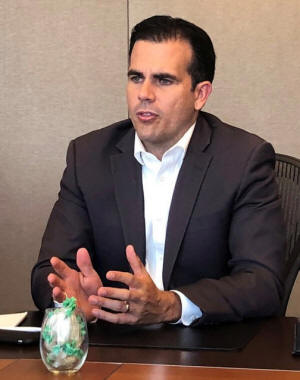|
Exclusive: Puerto Rico open for tourists
despite 'mixed-bag' recovery - governor
 Send a link to a friend
Send a link to a friend
 [September 28, 2018]
By Jessica Resnick-Ault and Nick Brown [September 28, 2018]
By Jessica Resnick-Ault and Nick Brown
NEW YORK (Reuters) - Puerto Rico Governor
Ricardo Rossello flew to New York this week on a mission: persuade
potential tourists that the hurricane-ravaged island was ready for their
return.
But Puerto Rico's recovery from last year’s Hurricane Maria has been a
“mixed bag,” Rossello told Reuters on Thursday, acknowledging that the
bankrupt U.S. territory, while improving, is far from out of the woods.
Puerto Rico has received only a small fraction of the federal funding it
needs to get back on its feet, Rossello said in a 75-minute interview,
and getting access to the rest could take more than a decade.
His administration estimates that fixing Puerto Rico fully will require
$139 billion, but the federal government has earmarked only about $60
billion to $65 billion for the recovery, he said. Of that, only about $3
billion to $4 billion has actually flowed into the island’s coffers.
Obtaining the remainder could take 10 to 11 years, he said, adding that
his team is lobbying the U.S. Congress for more money.
Compounding the problem is Puerto Rico's bankruptcy in U.S. federal
court, where it is trying to restructure $120 billion of debt and
pension obligations. There are also ongoing spending disputes between
the government and a federally appointed fiscal oversight board.
In the year since Hurricane Maria, Rossello has at times been diplomatic
regarding the federal government’s response, while at other times –
especially lately - adopting a more critical take. He has also been
criticized for sticking with an estimated death toll of 64 early-on,
when strong evidence suggested it could be higher. A
government-commissioned study by researchers at George Washington
University eventually pegged the toll at around 3,000.

When asked whether his administration’s messaging strategies have been
tied to an effort to maintain good relations with President Donald
Trump, Rossello said a “critical part” of the island’s recovery “is
making sure the federal government responds to our petitions.”
“So yes, I have opted for a path that involves dialogue, that involves
collaboration,” Rossello said, adding that he has not been afraid to be
critical.
If Trump does not sign the island’s request to extend the federal
government’s 100 percent coverage of repair costs, “I’ll be the first
one to fight it,” Rossello said, “and I’ll be the first to point out
that action, or lack of action, is one of the main obstacles to our
recovery.”
Rossello said Puerto Rico still has as many as 60,000 homes with
temporary tarp roofs. It also has hundreds of thousands of informally
constructed homes with many owners lacking title to their property.
Rebuilding will require the current ranks of about 45,000 construction
workers to grow to 130,000, according to Rossello, who recently signed
an executive order increasing the minimum hourly construction wage to
$15 despite opposition from the oversight board and the private sector.
POWER SHIFT
The island’s government is still considering initiatives that could make
the island’s troubled electricity grid more resilient, Rossello said.
Ultimately, the island hopes to generate 40 percent of its electricity
from renewables and steer away from fossil fuels. The shift would
require a new regulatory policy, approval by the bondholders, and,
potentially, investment from outside companies or organizations.
“We have received 10 to 12 unsolicited proposals for generation,” he
said, while acknowledging the government has yet to find a private
operator for the power utility's transmission and distribution
operations.
[to top of second column]
|

Puerto Rico Governor Ricardo Rossello speaks during an interview in
New York, U.S., September 27, 2018. REUTERS/Dan Bases

But changes at the electric agency known as PREPA, which Rossello
called one of the most troubled organizations in modern history,
will be gradual. The governor said he is working with a search firm
to identify outside board members for the utility, after nearly the
entire board quit in an uproar over appointment of a new CEO.
Limited electricity was a major problem for the island's small
business sector, according to a Federal Reserve Bank of New York
report on Thursday. A survey of more than 400 businesses with fewer
than 500 employees found 77 percent suffered losses as a result of
hurricanes Irma and Maria.
ISLAND BECKONS TOURISTS
Meanwhile, Rossello is trying not only to restore tourism, but to
expand it in such a way that it incorporates hundreds of square
miles of seaside and mountain communities that are largely
unvisited. Puerto Rico's tourism is small compared with other
Caribbean locales and tends to be centered in San Juan.
The island's visitor lodgings hit a 2017 high of 204,025 in July,
but fell to just under 30,000 in October following the hurricanes,
according to Puerto Rico Tourism Company data.
Convincing tourists to leave the capital, though, will require
easier travel. “Puerto Rico should be a multi-port destination,” he
said, discussing plans to beef up airport capacity in the south and
west of the island.
He emphasized the possibility of capitalizing on Puerto Rico’s
near-constant spate of community festivals. “We have flower
festivals, orange festivals, plantain festivals, coffee festivals,
music festivals.”
Rossello pointed to so-called chinchorreos as a possible draw,
events in which Puerto Rican foodies move from one inexpensive
eatery to the next.
“A bar crawl for food - that’s the best way to put it,” the governor
said, “and the island is small, so you start in one place and you’re
on a beachfront, and 15 minutes later you’re in the mountains.”
(Reporting by Jessica Resnick-Ault and Nick Brown in New York, Karen
Pierog in Chicago and Luis Valentin Ortiz in San Juan; Editing by
Daniel Bases and Matthew Lewis)
[© 2018 Thomson Reuters. All rights
reserved.]
Copyright 2018 Reuters. All rights reserved. This material may not be published,
broadcast, rewritten or redistributed.
Thompson Reuters is solely responsible for this content.
 |